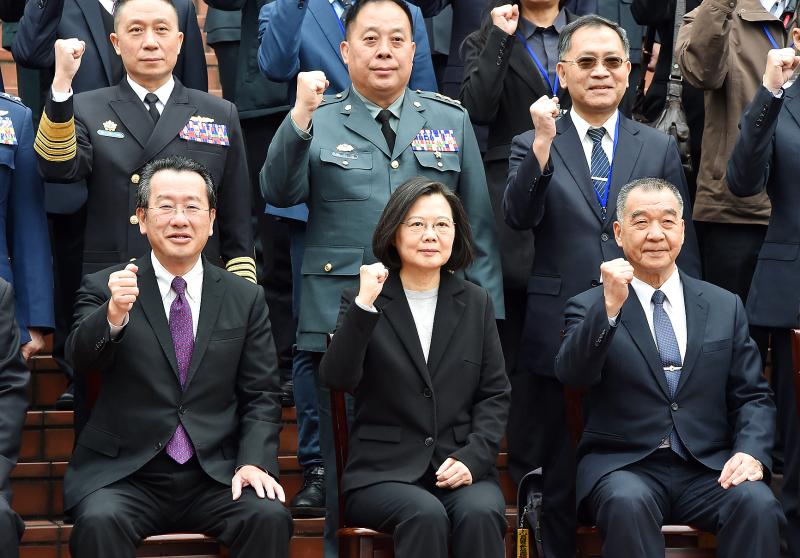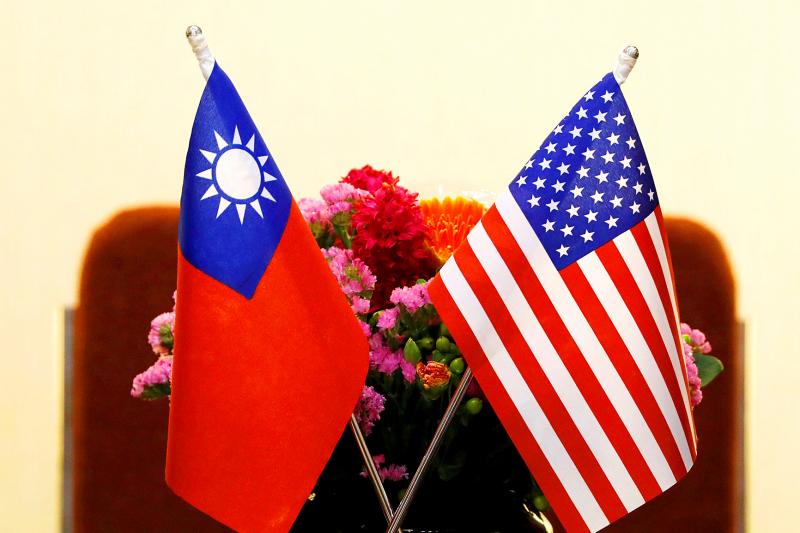Security talks between Taiwan and the US this week are to include discussion of military exercises and arms sales, a senior national security official said yesterday.
A delegation led by National Security Council Secretary-General Wellington Koo (顧立雄) is to participate in the annual Monterey Talks, considered to be the most important strategic collaboration between the two countries.
Although details are not made public as a matter of course, the United Daily News said working-level meetings are to be held from tomorrow to Friday ahead of high-level talks from Monday to Wednesday next week in Washington and Annapolis, Maryland.

Photo: Tu Chien-jung, Taipei Times
The talks, the second held since US President Joe Biden took office last year, are taking place against the backdrop of Russia’s war against Ukraine and increased Chinese military pressure on Taiwan.
Channels of communication between Taiwan and the US are clear, Presidential Office spokesman Xavier Chang (張惇涵) said yesterday when asked about the talks, while declining to comment on any agreements.
Ministry of Foreign Affairs spokeswoman Joanne Ou (歐江安) also declined to comment, saying only that the two nations would further deepen their cooperation on an already solid foundation.

Photo: Reuters
A senior national security official said on condition of anonymity yesterday that Washington is expected to focus on upgrades to existing equipment to enhance immediate combat capabilities as a response to uncertainties in the cross-strait situation.
This strategy differs from that of former US president Donald Trump’s administration, whose arms sales to Taiwan focused on new equipment, the official said, adding that cooperation on military exercises is also to be clarified.
Cooperation with the Republic of China Marine Corp would be an important topic, as the US Marine Corp has adjusted its strategy to act as “stand-in forces” for rapid deployment to the first island chain, the official said.
The US Marine Corp in December last year formalized the strategy in A Concept for Stand-In Forces.
Last month, Colonel Stephen Fiscus, assistant chief of staff for force development at US Marine Forces Pacific, said that the III Marine Expeditionary Force in Okinawa is focused on the “ability to stand in — by our footprints, our posture, our relationship with partners and allies — to kind of get the enemy in our guard” within their engagement zone, rather than remaining at a distance.
US military officials are emphasizing cooperation with allies, the official said, adding that shifting US priorities are in part due to heightened cross-strait tensions.
The US considers any Chinese military action in the first island chain to fall within its “weapons engagement zone,” they said.
The US Indo-Pacific Command’s engagement is “closer than people think,” with interactions shifting from “transactional” to “collaborative,” the official said.

US President Donald Trump yesterday announced sweeping "reciprocal tariffs" on US trading partners, including a 32 percent tax on goods from Taiwan that is set to take effect on Wednesday. At a Rose Garden event, Trump declared a 10 percent baseline tax on imports from all countries, with the White House saying it would take effect on Saturday. Countries with larger trade surpluses with the US would face higher duties beginning on Wednesday, including Taiwan (32 percent), China (34 percent), Japan (24 percent), South Korea (25 percent), Vietnam (46 percent) and Thailand (36 percent). Canada and Mexico, the two largest US trading

ACTION PLAN: Taiwan would expand procurement from the US and encourage more companies to invest in the US to deepen bilateral cooperation, Lai said The government would not impose reciprocal tariffs in retaliation against US levies, President William Lai (賴清德) said yesterday, as he announced five strategies to address the issue, including pledging to increase Taiwanese companies’ investments in the US. Lai has in the past few days met with administrative and national security officials, as well as representatives from various industries, to explore countermeasures after US President Donald Trump on Wednesday last week announced a 32 percent duty on Taiwanese imports. In a video released yesterday evening, Lai said that Taiwan would not retaliate against the US with higher tariffs and Taiwanese companies’ commitments to

‘SPECIAL CHANNEL’: Taipei’s most important tasks are to stabilize industries affected by Trump’s trade tariffs and keep negotiations with Washington open, a source said National Security Council Secretary-General Joseph Wu (吳釗燮) arrived in the US for talks with US President Donald Trump’s administration, a source familiar with the matter said on Friday. Wu was leading a delegation for a meeting known as the “special channel,” the Financial Times reported earlier. It marked Trump’s first use of the channel since returning to the White House on Jan. 20. Citing a source familiar with the matter, the Financial Times reported that Minister of Foreign Affairs Lin Chia-lung (林佳龍) was also a part of the delegation. The visit came days after China concluded war games around Taiwan and amid Trump’s

CHIP EXCEPTION: An official said that an exception for Taiwanese semiconductors would have a limited effect, as most are packaged in third nations before being sold The Executive Yuan yesterday decried US President Donald Trump’s 32 percent tariff on Taiwanese goods announced hours earlier as “unfair,” saying it would lodge a representation with Washington. The Cabinet in a statement described the pledged US tariffs, expected to take effect on Wednesday next week, as “deeply unreasonable” and “highly regrettable.” Cabinet spokeswoman Michelle Lee (李慧芝) said that the government would “lodge a solemn representation” with the US Trade Representative and continue negotiating with Washington to “ensure the interests of our nation and industries.” Trump at a news conference in Washington on Wednesday announced a 10 percent baseline tariff on most goods